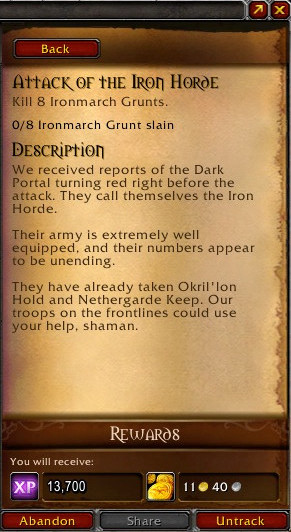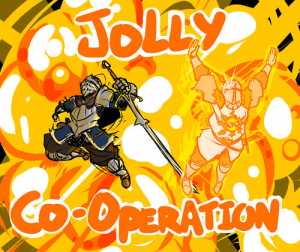Online Role-Playing: The Development of a Reactive Narrative
Video game narratives have evolved with the technology and audiences available to them, becoming more complex, vibrant, and central as the years went on. Role-playing games (RPGs) are especially indicative of this, considering the heavy reliance on immersion and storyline development that is central to much of the genre. But the advent of online gameplay has struck RPGs in a unique way, due to some inherent problems in combining the individualized story with player interaction. Though understanding where RPG storytelling originated and where it has shifted to in response to these issues, a savvy developer can see patterns indicating a new sort of narrative to be explored, one written by the interactions between players.
The Past: Tabletop Narrative and the MMO
Often called the grandfather of Massively Multiplayer Online (MMO) RPG gaming, World of Warcraft represents the early forays into online narration, later replicated by dozens of competitors. Like many MMOs that came after, World of Warcraft created an immersive story in the same manner as early Role-playing tabletops, such as Dungeons and Dragons or Chainmail. This narrative style focused on the player or group of players as a necessary force for storyline progression.

In World of Warcraft, this narrative style can translate to dialogue that reminds each player he or she is the only one who can save the town, slay the dragon, or find the treasure. While this works well in the largely independent universes of tabletop games or offline narration, it causes two significant problems when applied online. Firstly, the inflation of the player’s importance is largely unbelievable; and secondly, the narrative choice limits the possible gameplay options. Both problems are heavily intertwined, and occur at the intersection of online freedom and offline importance.
The tabletop narrative style proposes that players are capable of changing the world around them in dramatic ways. When a player is asked to destroy the orc stronghold, for example, the narrative may lead a great battle that destroys the hold, a powerful magical force that forever marks the landscape, or a diplomatic treaty that changes the political future. Each player is free to make any choice they like. If this quest is asked of a thousand players, however, the narrative must be infinitely repeatable, never changing the outcome for other players. Despite being asked to save the world from the orc menace, the gameplay will more likely be slaying a hundred quickly-spawning enemies. In the end, the story must be the same for the next great hero, which traps developers into smaller-scale, less immersive paths.
Moreover, this sort of narrative puts pressure on the game developers to continue creating more experiences for players to have. While World of Warcraft has soothed this issue by creating unique classes which perform quest arcs differently, by including repeatable group quests, or through other methods, these are temporary bandages to a larger content problem. While developer Blizzard has promised continued support and development for World of Warcraft, their subscription numbers continue to dwindle, and the team holds no illusions of World of Warcraft making a rebound. According to Blizzard lead game designer Tom Chilton, part of this on-going attrition is specifically due to problems with experiences reliant on expanding content.

Other followers of tabletop narration are seeing a similar decline, such as Star Wars: The Old Republic, Lineage II, and countless other available MMOs. While it would be premature to say these games are dying, the RPG genre now leans away from tabletop storytelling. Players and developers are beginning to explore narrative styles that translate to freer gameplay with more meaningful decisions, a change that requires a new understanding of storyline progression and player importance.
The Present: Interaction-based Narrative
When the world of Skyrim is attacked by dragons, there is no doubt that the player will be the mythical Dragonborn, capable of stopping the beasts like no other. When Bowerstone needs a hero, the player will have the lineage, skill, and luck required to solve any problem. Death leads to a “Game Over” screen and a restart because the narrative cannot exist without the player’s success. That is to say, the narrative is a passive thing which can react to the player, instead acting as boundaries for his or her actions instead of developing alongside them. This centrality of the player became a standard in storytelling because of the assumption that no one would enjoy being the second fiddle. When online, the world must continue onward, regardless of the individual, though the narrative must find some way to accommodate this, or risk nonsense and disbelief. Some recent games have taken unique approaches to solving this problem, each indicative of the larger challenge to tabletop narrative.
Despite being a series heavily reliant on RPG elements, From Software’s Dark Souls series represents a unusual take on online storytelling. The central campaign in each game is an iteration of a cycle of universal death and rebirth, a cycle which demands the emergence of a hero to continue it, but over which the hero has no control. The hero is expected to die numerous times as part of this cycle, and each time must continue onward as part of the plot. At best, the player represents just another of many heroes who have successfully completed the cycle, only to see it restart again. At worst, he or she is only there to aid the other players online, never destined to succeed.

By belittling the player to a mere pawn, From Software allowed for numerous design choices that were otherwise impossible. Failure to progress the storyline does not represent an end, but instead becomes the basis of an interaction with someone else. In-game, the player can find messages written by fallen heroes, “spirits” of other players who can help for short times, or visions which show other players’ mistakes. Likewise, the player’s character is nothing more than a spirit or a message to the next person. Interestingly, if a player helps another, his or her personal storyline does not progress, meaning someone else must help them in return. This creates a continuous give-and-take and forms a basis for interactions as players seek to further each other and, in return, be bettered. The narrative responds most readily to the interaction, rewarding players for continuing the cycle.
Riot Game’s League of Legends takes a different approach to the problem. Relying heavily on both strategy and RPG roots, the genre of Multiplayer Online Battle Arenas (MOBAs) have come into the popular eye recently, with League of Legends leading the march. Again shrinking the importance of each individual player, Riot Games chose to do this by making each player one of many faceless summoners, arbitrators of the combat-oriented judicial system of the world. These summoners never even interact directly with the combat, as they rely on a selected champion to fight for them, nor do they know what cause they are fighting for, making them just as much pawns as the heroes of Dark Souls.

Similar to the Dark Souls series, Riot Games created a scenario in which the narrative is strongest when players interact. Partially, this is achieved by the competitive nature of the game, meaning that the human element will help balance the two teams in combat. This has been furthered by careful decisions, such as boss monsters which can only be beaten as a group, or defensive structures that require coordination to attack or defend. While no individual player can win or lose a game for the team, they are nonetheless necessary for the overall success of their team. By tying interaction and progression together, Riot Games has created a system which necessitates and rewards effecting other players progression. There is no overarching plot-line promised to each player, and no guarantee that they will be the hero to save the day, meaning the world can react actively to their decisions, whether for better or worse.
League of Legends further focus the narrative on player interaction by rewarding players who deepen the story without punishing players who would prefer to simply play. For example, League of Legends holds a rich history of lore, complete with character backgrounds, biographies of each arena, special events and multi-media productions. While ignoring the lore harms no one, as the storyline isn’t the focus of Riot Games’ attentions, interested players will find special moments created by their choices. Placing two champions against each other with a rivalry, for example, will provide both players with an entirely optional side object to defeat their opponent. The objective is essentially worthless in terms of progression, but provide additional opportunities for players to create plot-lines and drama through their interactions.
Another interesting approach to player-interactive narrative is Mojang’s Minecraft. Fans of the game would be hard-pressed to describe any sort of central plot or story, and the developers have offered nothing as explanation. Instead, the game simply leaves a player or players in a unique world ripe with enemies, treasures, villages, and unexplored terrain. Players must make their own meaning from each game and, whether with friends or strangers, are continuously affected by their interactions with others. Each decision by each player permanently alters the world of other players, and individual stories emerge from the cooperation or competition caused by the interaction. Even taken to this extreme, where there is nothing to progress, Minecraft has still become a widely successful game, as well as spawning dozens of YouTube and Twitch channels specifically focused around recording the spontaneous and enticing narratives that form.
The Future: Developing a Reactive Narrative
There may have been a conflation of the concepts of a reactive narrative and a reactive world. Simply making a powerful game engine with realistic physics will not create the sort of interaction seen in the aforementioned games. The first step requires a rethinking of the narrative role in video games, which has long been much the same sort of storytelling as a movie or a book, only with the player or players as the protagonist. Instead, video games afford the opportunity to put players in the role of director or screenwriter, a promising concept that has not yet been explored to its full potential. Beyond that, the developers must make many decisions to further this feeling, via the methods of these three games, or by creating another take.

Clearly, there is an interest in this sort of writing. The rapid reaction of fans is not merely visible in the consumers who bought and played the games, but also in the explosive energy of fans who watch these games. League of Legends provides the single strongest example, considering the unbelievable size of the audience at the most recent season championship, not to mention the overwhelming percentage of Twitch streams dedicated specifically this one game. Much like sports on television, League of Legends has become this popular on streams because of the unexpected, player-reliant narrative. More than just a win-or-lose struggle, League of Legends presently deeply dramatic moments, and viewers can become attached in much the same way as to actors on TV. This is in clear opposition to games with large player bases but low viewership, like Call of Duty, which lack the reactive narrative.
The opportunities presented by the reactive narrative are innumerable, and the great games mentioned here have only begun to scratch the surface. With the improvement of console and computer technology, developers are able to make virtual worlds with realistic physics and responsive animations, and the amount creative power afforded players is unheard of. As Fable Legends, an upcoming game from Microsoft Studies and Lionhead Studios, proposes another twist on the competitive RPG, Assassin’s Creed Unity begins testing the action-adventure waters for interactive multiplayer. When Project Spark is set to give all players a world-building power, 7 Days to Die brings shooter elements to the Minecraft formula. Developers have latched on to the potential of the reactive narrative, and players have fallen in love with the early successes. RPGs may have roots older than video games themselves, but bringing them into the modern era has made an important step forward for the art.
What do you think? Leave a comment.











If I had $1 for every well written article by Christopher Vance I’d have at least $1
If I had $1 for every kind comment by Joseph, I would have at least $1. Thank you for the read!
Thank you for this great summary. It’s going to be interesting when game players are wearing 3D goggles that will make them feel like they are in the scene.
Virtual reality technology is still a ways away, at least in any usable form. Still, I suspect that will be the catalyst for a shift away from largely visual story-telling, believe it or not. Unlike TV-and-Controller setups, a VR system will present opportunities for more nuanced sounds, blocking, etc. meaning that players may be challenged to interpret the game more.
Project Spark sounds great!
I’ve been gaming on PC and consoles since 1990, when I got the NES and Prince of persia for Pc =), I’ve played so many games…and I think I’ve got some good ideas I would like to share with others.
I always wanted to make games… I think this game is a must for me!! =)
http://www.projectspark.com/
You can explore it a little for yourself. This past E3 really showcased how invested the developers were in the game, I think.
I love creative tools on console. Music 2000 was my favorite on ps1. And I can’t wait for lbp 3.
I would love a fable mmo that also included a single player kingdom. You would have to leave your kingdom and be transported to the main world for the mmo part, but make the single player first and release it then add features like multiplayer dungeons and build on the mmo part while we kick ass on the single player game. They could even make it as a DLC. That would to me, kick ass on console.
I’m more in favor of comfortable integration of online and offline play, so that it’s more seamless of a transition. If they could find some way to organize THAT with your idea, I would be very happy!
The second screen on Fable Legends and the division are amazing ideas.
So i just finished the main storyline of new Assasins Creed. Now i thought in general the game was great but in terms of the storyline i felt it was very repetitive and was left a little disappointed. going by what i saw in the commercials i though the story would be more heavily involved around participating and leading in the actual ‘revolt’ with a group of assassins, as opposed to following a very personal story with Arno in avenging his fathers death. Did anyone else feel the same way or am i missing something in the game???
I’m really enjoying this game. The new patch seems to have fix most of the issues it had at launch. The only time I notice an issue is when there are large crowds of civilians and the game starts to lag a bit. Other than that, I haven’t noticed any other issues with the game. There’s really so much to do and the graphics are fantastic. It’s one of the best looking games out there if you ask me. There are plenty of great side missions and ways to customize your character, which really make it worth the purchase. I’m not really a huge fan of the main character this time, but the main story is great and enjoyable so far. IMO, if you really enjoyed the Ezio Trilogy like I did, then you will really enjoy AC Unity. I really think this game deserves a post-patch review because so many are missing out on a great game just because of the problems it had at launch.
Great insight into the future of RPG interactive gaming!
Awesome article! I’ve never played RPGs my self but you made me see it in a new light. Well done!
Thank you! I don’t tend to play them all that much myself either, but I’m fascinated by them as developer, and will likely be working with them soon from a production angle. This article was a way to organize some of my thoughts, as well as see what the world thought.
SPOILERS for AC…
I am get annoyed with all the sad endings in assassins creed now. I had my hopes up that elise and arno could get their revenge and then go on to a new life. But no. They had to kill elise. My hopes were crushed. And now I can’t get the upsetting ending out of my head.
Interesting concepts to look forward to.
Fable series is so… inferior to any other RPG like Elder Scrolls, The Witcher, Mass Effect… I don’t understand why people buy that game. Fable 2 and 3 were terrible games… Skyrim for dummies… They are boring, repetitive, with no challenge, and always treat you like a stupid player. The last good game of the series was in 2005, the first one. Since that, just stupid games, with a lot of marketing and promises of “inovation”. After trying to play Fable 2 and 3, I want to move away from this waste of time.
Fable 2 was a lot of fun, not everyone loves dark and depressing games 24-7, I loved Skyrim and Oblivion and the Witcher and Mass Effect, but that does not mean I cannot love Fable also, it was always more fun and light hearted. 99% of games out there now are doom and gloom games, its nice to have a bright and colourful, game with a bit of humour every so often
Fable is and never has been “Skyrim for dummies”. That’s a preposterous and stupid statement. You can’t always compare games that easily. Just because they share a fantasy setting does not mean they are really alike in any way. I like Fable because it is charming and fun. I also like Skyrim, but saying that Fable is easy and Skyrim is not is just another reason why your statement is stupid in the first place. These are completely different games, and don’t deserve to be compared any more than something like Oblivion to Zelda.
And for someone who wants “innovation”, you sure aren’t doing yourself any favors by acting like Skyrim is an example of such innovation.
Skyrim is just as easy as Fable if not easier due to its broken crafting and leveling system.
Project spark sucked. I tried the beta – sucked. All the player generated maps sucks. It was cool to see what people could do, but if I wanted to play pinball, I’d buy a pinball game. If I wanted to play Zelda, I’d go play Zelda.
None of the games were unique. None I would play more than once
The concept was cool but execution sucked.
Wow, what an incredibly insightful and informed opinion, is what I would have said if you knew more than one adjective. Everyone I know who has played this game had fun with it, I have no idea why people feel the need to whine about everything, even when it’s free. Complaining about doing something optional by choice for free is like complaining about your ability to breath, if you don’t like it, don’t do it, but don’t shout your pointless, nonsensical gripes from the mountain tops of internet forums because nobody cares.
How are you going to turn fable in to a linear game? I want freedom of exploration, I want to be on my own. I don’t want to play a glorified Dungeons and Dragons. Fable 1 and 2 did it right. I wish they would just expand on that instead of messing with something that works and is fun.
I made a full RPG system in beta of PSpark (complete with unlockable abilities and stat changing orbs to take the place of armor), love this game so much
This is the first Microsoft exclusive I’ve seen that I’m actually pretty envious about as a PS player. Looks really interesting.
Project spark is a good tool but sometimes it can be too crazy with koding .. I actually have spent a few hours just koding one thing because I didn’t like the default brain..
Can you do a scifi-cyberpunk third-person-shooter-RPG with it? That is something I would wanna do myself with a big budget, but I don’t know how to program and what I have in mind it’s too ambitious so this is one way to express myself in the gaming community.
LARPing is the best!!!
I have always been a casual gamer, but I am increasingly astounded by the sheer amount of work that goes into games. I’ve never been a massive fan of GTA for example, but the 5th one amazed, with the different options and endings and the online missions? I prefer to play other games, but i will quite happily watch my bfreind playing GTA
Fable series died after lost chapters. It shouldn’t even be called fable anymore.
Great article, thanks!
“Instead, video games afford the opportunity to put players in the role of director or screenwriter, a promising concept that has not yet been explored to its full potential.”
This is an extremely valuable point. Mark Cuban has said that he believes the future of entertainment is interactive entertainment. He was speaking specifically of events where the consumer goes to, say, “spy camp” for the weekend. But I think since the embrace of the internet, we’ve gotten more and more used to expecting our entertainment be… consumer-malleable, for lack of a better term. Fan fiction, modding, and fan art are all examples of fans not being willing to passive enjoy what’s given by the producers of media — we want to stick our hands in, makes changes, be creative ourselves. We want to write and direct as well as star in the game.
Interesting overview of the development of the RPG genre over time!
While I enjoyed the read, I can’t help but feel that there was some drift in how the term “narrative” was being applied here. The dressing of many cyclical universes is mainly a dressing for the online components of Dark Souls, but are vacant from a completely offline run. Even an online run is a consistent, linear narrative that persists past each ‘cycle’ of the player’s death. Controling a character in LoL is still just controlling the 1 character, and is not much different than a third-person action game with a player-character. So something like Overwatch, with its mid-match switching, executes on that narrative dressing of being a ‘summoner’ in a way not present in LoL at all. An explanation of an imaginitive framework does not quite count as a game’s narrative if it is not present in the game itself.
I think that the player using a game to tell their own story does not seem to catch this concept of a Reactive Narrative either. It is a narrative for sure, but the game is the medium for making the story. Like D&D, the game doesnt necessarily have any story, but is a creative writing tool to create plot through random chance and improvisation.
There must be some middle ground here between games as a preset narrative, games with no narrative at all, and games as a creative toolset.